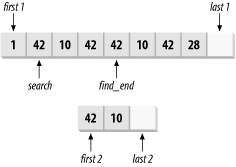Name
find_end function template — Searches for the last occurrence of a sequence
Synopsis
template<typename FwdIter1, typename FwdIter2> FwdIter1 find_end(FwdIter1 first1, FwdIter1 last1, FwdIter2 first2, FwdIter2 last2); template<typename FwdIter1, typename FwdIter2, typename BinaryPredicate> FwdIter1 find_end(FwdIter1 first1, FwdIter1 last1, FwdIter2 first2, FwdIter2 last2, BinaryPredicate pred);
The find_end function
template finds the last (rightmost) subsequence [first2, last2) within the range [first1, last1), as illustrated in Figure 13-5. It returns an
iterator, find_end in Figure 13-5, that points to
the start of the matching subsequence or last1 if a match cannot be found.
The first form compares items with the == operator. The second form calls
pred(*iter1, *iter2).
 |
Technical Notes
Let length1 = last1 - first1 and length2 = last2 - first2.
The find_end function
template returns first1 +
n, in which n is the highest value in the range [0,
length1 - length2) such that *(i + n + m) == (first2 + m) for all i in the range [first1, last1) and m in the range [0, length2). It returns last1 if no such n can be found.
Complexity: at most length1 × length2 comparisons are performed.
Get C++ In a Nutshell now with the O’Reilly learning platform.
O’Reilly members experience books, live events, courses curated by job role, and more from O’Reilly and nearly 200 top publishers.

